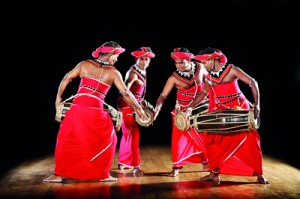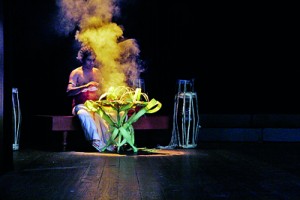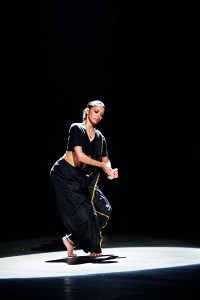A triumphant return to Australia
View(s):Forty-three years after the Chitrasena Dance Company had first performed in Canberra, they danced there again this January. Here the performance is reviewed by Bill Stephens
of the Canberra Critics Circle
It’s been a long time between visits. The Chitrasena Dance Company from Sri Lanka, last performed in Canberra in 1972, headed then by the

Kandyan drummers. Pic by Luxshmanan Nadaraja
charismatic founder of the company, Chitrasena and his wife, Vajira. After a week performing at the Sydney Festival the company returned to Canberra for just one performance, this time with Chitrasena’s grand-daughters, choreographer Heshma Wignaraja, and principal dancer, Thaji Dias, at the helm.
The Chitrasena Dance Company specialises in Kandyan dance, a 2,500 year old ritual-dance tradition which only evolved into a performance art in the 20th Century with the emergence of virtuoso dancer Chitrasena who is credited with bringing the traditional

Ritual master. Pic by Christopher Rebert
dances from the village rituals to the modern stage. Over the years his children and grand-children have continued his tradition, evolving, adapting and refining the ancient art form to suit the modern stage.
This current program Dancing for the Gods was developed especially for the Sydney Festival to showcase the diversity in the different forms of belief and worship within Sri Lankan traditional dance and to celebrate the Sri Lankan view of dance as a form of worship.

Thaji Dias: Truly mesmerising performance. Pic by Christopher Rebert
The performance was presented in three sections, Ritual, Rites and Reflections, performed without interval by seven bejewelled and bangled dancers and four colourfully costumed drummers. The drummers also chanted and vocalised at various points, joined in the dances and added to the spectacle in the finale by flicking bright red tassels on their headdresses. To make sure the audience could follow the action; each section was introduced with a clear, precisely spoken, voice-over narration in English.
The settings were simple and uncluttered, dramatic lighting focussing the attention on the energetic, mostly joyful, dancing. For one section, three rows of flickering candles created a contemplative mood. For another, smoke and flaming torches brandished by the dancers brought excitement and a sense of danger to the proceedings.
The show commenced intriguingly with the ritualised seeking of the blessings of the gods and gurus on the theatre and its audience. A lone, spot-lit dancer chanted over a smoking cauldron while an exotically costumed masked deity, accompanied by drummers, moved through the theatre to the stage. Group and solo dances followed in quick succession, leading to an exquisite solo performed by principal dancer Thaji Dias costumed in white.
Images of the Dancing Shiva immediately came to mind watching this solo. Dancing to sets of intricate drum rhythms, the long constantly evolving sequence was characterised by graceful undulating arm movements and punctuated with carefully upturned hands and angular feet, drops into deep squats with turned out hips, quick jumps and foot beats. Her beautiful face serene and smiling, completely in the moment, and dancing with all the grace, skill, security and showmanship of a classical ballerina, Thaji Dias was truly mesmerising.
However it is in the group dances, with each intricate step and movement performed in perfect unison by either three male dancers or three female dancers, or indeed the entire company in the finale, that the Kandyan style and technique can best be appreciated. Each dancer is superbly trained, each step so precisely polished and executed, that it’s possible for even the most uninitiated observer to soon recognise and admire the movement and its execution, and even variations to the original, as dancer and drummer challenge each other in later sections.
Dancing for the Gods represents the distillation of 70 years of endeavour by the Chitrasena Dance Company to evolve, preserve and present Kandyan dance to be enjoyed not only by Sri Lankans but by world audiences. As such it is a fascinating and compelling demonstration of the success of their endeavour, and one would hope that Australia does not have to wait another 40 years for another opportunity to enjoy this fascinating and accomplished company.


